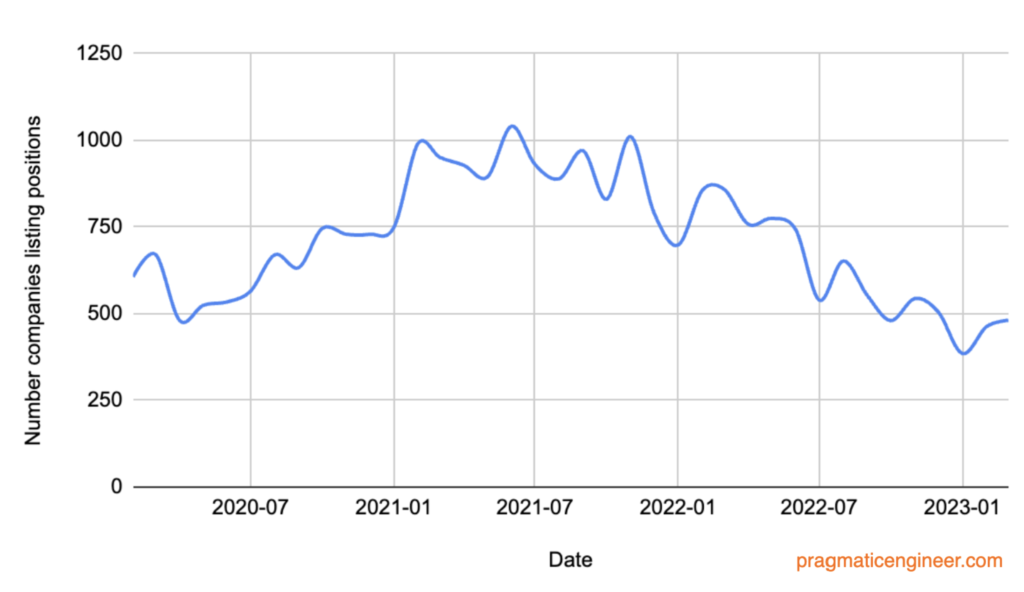Indeed is the first such large HR Tech company to downsize its team and joins the other “recession symbols” in our industry. Nonetheless, we can look for consolation in the quite high (but declining) number of job offers for programmers and the freedom that comes with a home office. Well, unless you work for Apple…
Layoffs at job portal
When a platform used to publish job offers lays off 15% of its team, it’s perhaps the best proof that things are not colorful. I’m thinking about Indeed, which will soon say goodbye to 2,200 people. According to the platform’s CEO, Chris Hyams, the reductions will affect “almost every team, function, level and region.” Those who will have to leave the company will receive a 16-week severance package (or two weeks’ salary for each year worked, if the total turns out to be higher), six months’ support in the search for a new job, and a one-year mental health support. Respect!

In a statement, Chris Hyams also shared his pessimistic outlook for the coming quarters: “Last quarter, US total job openings were down 3.5% year over year, while sponsored job volumes were down 33%. In the US, we are expecting job openings will likely decrease to pre-pandemic levels of about 7.5 million, or even lower over the next two to three years.”
Gergely Orosz sees similar trends in our sector. And while there are still more IT vacancies in many countries than there were in 2020, clearly the peak of jobs for programmers is behind us. The gradual, consistent decline has continued uninterrupted since 2021. Looking from this perspective, more and more vacancies are seen only in France and Japan, which is hard to explain given global trends. One engineer quoted in the text suggests that… it may have something to do with the increasing popularity of the Indeed portal in the cherry blossom country. What a paradox!

On the other hand, the carousel of layoffs hasn’t stopped at other corporations either. In the past week, more than a dozen major companies have announced further reductions, such as Accenture (19k people), Meta (10k people), Amazon (9k people) and Disney (7k people). The sad standard.
Recently, I’ve even noticed that some companies are starting to use the fact of continued hiring, or simply the lack of layoffs, in their PR efforts. An example would be Flipkart, which struck out on dozens of portals announcing that it would not conduct mass layoffs. Could it be that “responsible hiring” is becoming a new pillar of marketing strategy?
Sources:
- https://edition.cnn.com/2023/03/22/business/indeed-layoffs/index.html
- https://www.indeed.com/press/releases/a-message-from-our-ceo-chris-hyams?co=US
- https://blog.pragmaticengineer.com/is-there-a-drop-in-software-engineer-job-openings-globally/
- https://techcrunch.com/2023/03/27/tech-industry-layoffs/
- https://www.livemint.com/companies/news/no-mass-layoffs-at-flipkart-raghavan-11679847585041.html

Return to the offices goes very hard (fortunately)
I’ve already written quite a bit in my Career Weekly about the desire to bring us back to offices. Many employers are hoping to bring discipline and efficiency back to the office after several years of free home office. At the forefront of supporters of office work has always been Elon Musk. No one is surprised by subsequent reports of late-night emails reminding the Twitter CEO to work from the office, or that the San Francisco headquarters was half empty yesterday.
However, Apple has surprised us and gone on a similar path. Those who fail to show up at the office at least three times a week will receive an official warning. This rule was introduced last summer, but only now will it be respected so scrupulously.

“For many of you, I know that returning to the office represents a long-awaited milestone and a positive sign that we can engage more fully with the colleagues who play such an important role in our lives” – Tim Cook wrote to his employees, who previously referred to remote work as “the mother of all experiments.”
Representatives of the “Apple Together” group, which organized a Twitter petition against the return to the offices last year, have a slightly different view on the subject. At the time, 1,200 Apple employees signed it.
Just in this one aspect, programmers on a B2B contract can feel safer – nobody forces you to work from an office. Right?
Sources:
- https://www.businessinsider.com/elon-musk-emailed-twitter-staff-office-is-not-optional-2023-3?IR=T
- https://www.businessinsider.in/tech/news/apple-is-threatening-to-take-action-against-staff-who-arent-coming-into-the-office-3-days-a-week-report-says/articleshow/98972685.cms
- https://fortune.com/2022/08/15/apple-return-to-office-policy-remote-hybrid-work/




